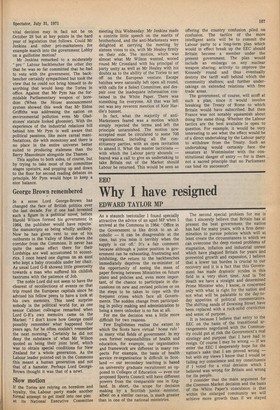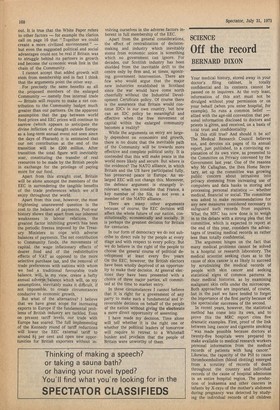EEO
Why I have resigned
EDWARD TAYLOR MP
As a staunch teetotaller I found specially attractive the advice of an aged MP when I arrived at the Commons in 1964: 'Office in the Government is like drink to an alcoholic — it can be disagreeable at the time, but you miss it terribly when the supply is cut off.' It's a fair comment because although a junior position in government can be exhausting, frustrating and inhibiting, the return to the backbenches immediately deprives the ex-minister of the opportunity of seeing the mass of paper flowing between Ministries on future plans and policies and, even more important, of the chance to participate in discussions on new and revised policies or on the steps to be taken to cope with the frequent crises which face all Governments. The sudden change from participating in policy making and administration to being a mere onlooker is no fun at all.
For me the decision was a little more difficult for two reasons.
Few Englishmen realise the extent to which the Scots have virtual 'home rule' in many vital fields of government. In my own former responsibilites of health and education, for example, our organization and framework are different in many respects. For example, the basis of health service re-organization is difficult in Scotland — our secondary teaching is based on university graduate recruitment as opposed to Colleges of Education — even our proposed Sports Council will have different powers from the comparable one in England. In short, the scope for decision making by a Scottish junior minister, albeit on a similar canvas, is much greater than in one of the national ministries. The second special problem for me is that I sincerely believe that Britain has at present the best government the nation has had for many years, with a firm determination to pursue policies which will at least create the circumstances in which we can overcome the deep rooted problems of stagnation, inflation and industrial unrest which have plagued Britain for years and prevented growth and expansion, I believe that a lower tax burden is crucial to our recovery and it is a fact that this Govern ment has made dramatic strides in this field in a very sliort time. And in Ted Heath we have a straight and determined Prime Minister who, I know, is concerned only with what is right for the nation and not what will be palatable to the day-today appetites of political commentators. The shifting sands of Downing Street have been replaced with a rock-solid conviction and sense of purpose. It is because I believe that entry to the EEC on the basis of the transitional ar rangements negotiated with the Community could put at risk the Government's real strategy and purpose that I have had to resign. Of course I may be wrong — if we enter the EEC I desperately hope for the nation's sake that I am proved wrong — but with my views I know that I would be failing my conscience and my constituents if I voted for a vital decision which I believed was wrong for Britain and wrong for its people.
I consider that the main argument for the Common Market decision and the basis of the White Paper's conculsion is that within the enlarged community we will achieve more growth than if we stayed
out. It is true that the White Paper refers to other factors — for example the clarion call on page 16 that "Together we could create a more civilized environment" — but even the suggested political and social
advantages could not be real if Britain was to struggle behind its partners in growth and become the economic weak link in the chain of the Community.
I cannot accept that added growth will stem from membership and in fact I think that the arguments point the other way.
For precisely the same benefits as all the proposed members of the enlarged Community — namely free internal trade — Britain will require to make a net contribution to the Community budget much greater than our partners. On the apparent assumption that the gap between world food prices and EEC prices will continue to narrow (which appears to anticipate the divine infliction of draught outside Europe as a long-term annual event not seen since the days of Pharaoh) it is estimated that our net contribution at the end of the transition will be £200 million. After transition the total figure will inevitably soar, constituting the transfer of real resources to be made by the British people in exchange for the privilege of paying more for our food.
Apart from this straight cost, Britain will be alone amongst the members of the EEC in surrendering the tangible benefits of the trade preferences which we sill enjoy throughout the world.
Apart from this cost, however, the most frightening unanswered question is •the cost to the balance of payments. Post-war history shows that apart from our inherent weaknesses in labour relations, the greatest factor inhibiting growth has been the periodic freezes imposed by the Treasury Ministers to cope with adverse balances of payments. The net contribution to Community funds, the movements of capital, the wage inflationary effects of dearer food and of the redistributive effects of VAT as opposed to the more selective purchase tax, and the removal of trade preferences with nations with whom we had a traditional favourable trade balance, will, in my view, create a hefty annual adverse balance which will, on my assumptions, inevitably make it difficult, if not impossible, to create circumstances conducive to economic growth.
But what of the alternative? I believe that we have great scope for increasing exports to Europe if the fundamental problems of British industry are tackled. Even on present tariff levels, our trade with Europe has soared. The full implementing of the Kennedy round of tariff reductions
will lower the EEC external tariff to around 8i per cent and open new opportunities for British exporters without in
volving ourselves in the adverse factors inherent in full membership of the EEC.
Apart from the general considerations, the effect of centralization of decisionmaking and industry which inevitably stems from economic union is something which no government can ignore. For decades, our Scottish industry has been shielded from the inevitable drift to the centre only by firm and, at times, agonizing government intervention. There are few who would argue that the major new industries established in Scotland since the war would have come north cheerfully without the Industrial Development Certificate policy. Of course there is the assurance that Britain would continue IDCs in our own country, but how can an IDC policy be meaningful and effective when the free movement of capital within the enlarged community becomes a reality?
While the arguments on entry are largely dependent on economics and growth, there is no doubt that the inevitable path of the Community will be towards more effective and complete political unity. It is contended that this will make peace in the world more likely and secure. But where is the evidence? The NATO alliance, in which Britain and the US have participated fully, has preserved peace in Europe. An enlarged EEC will not change this. Moreover, the defence argument is strangely irrelevant when we consider that France, a key member of the Six, is not even a member of the NATO alliance.
• There are many other arguments because, of course, the EEC decision will affect the whole future of our nation, constitutionally, economically and socially. It is perhaps the greatest decision for Britain for centuries.
In our form of democracy we do not subcribe to direct rule by the people at every stage and with respect to every policy. But we do believe in the right of the people to choose the general course of political development at least every five years On the EEC, however, the British electors have been wholly deprived of an opportunity to make their decision. At general elections they have been presented with a choice of three major parties, all committed at the time to market entry.
In these circumstances I cannot believe that it is right for a government of any party to make such a fundamental and irreversible decision on behalf of the people of the nation without giving the electorate a more direct opportunity of assenting.
I have made my decision. Time alone will tell whether it is the right one or whether the political leaders of tomorrow will require to retreat to a Whitehall bunker and proclaim that the people of Britain were unworthy of them.











































 Previous page
Previous page